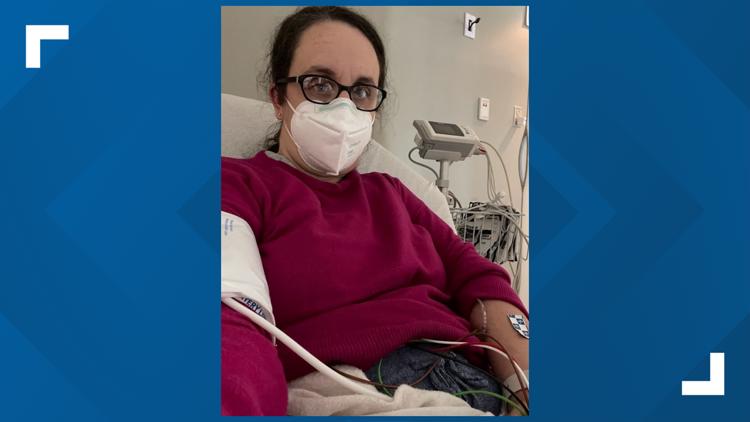TAMPA, Fla. — A woman dealing with a years-long battle of long COVID-19 shared how her health battle resulted in a Lyme disease diagnosis.
"This is my story about getting Lyme disease again, after getting the COVID booster," Tara Foti said.
Foti has 20 years of experience working in healthcare and a PhD in public health. In 2016, she contracted Lyme disease. She was treated with antibiotics and returned to full health within a year.
She thought she was done with Lyme disease after moving to an area without ticks. In 2021, Foti got her first COVID-19 booster after getting vaccinated. She had the usual symptoms of fatigue and body aches, but this time, they didn't go away.
"And then instead of it going away, it just got worse and worse, to the point that I was practically bedridden by the end of the month," Foti shared.
That's what her life has looked like for the last two and a half years.
After repeated testing, Foti tested positive for late-stage neurological Lyme disease. Unlike her previous Lyme disease diagnosis, treatment this go around was not nearly as simple.
"It's been almost two and a half years now," Foti said. "And I've never had a day without symptoms. I am debilitated to the point that I can't read. I can't take care of my kids. When I stand up my heart rate and blood pressure gets so high that I really can't stand for more than a couple minutes."
Foti got her diagnosis from a phone call from the state health department.
"So someone in Florida called me and said, 'your blood test was reported to us, we have to investigate and then report it to the CDC.' So we talked on the phone for about half an hour, I give them my whole health history, all of my diagnoses, all of my symptoms," Foti shared. "And towards the end of the call, they said, 'Well, based on our criteria that we have, you have what we call late stage, neurological Lyme disease.' And I was like, great, what do we do? You know, like almost in tears at this point, like, Yes, I'm relieved to have this information. But what do we do? And she said, 'The goal would be to keep you as comfortable as possible.' There are no treatments,'" Foti recalled.
That phone call left her feeling hopeless, as though the type of care given to end-of-life patients was her best option. In her search for answers, Foti found a community of people on a health journey similar to hers, people who had a COVID vaccine or booster that then flared up symptoms of Lyme disease.
"I've become a member of different communities of people with chronic health conditions that look like mine, Foti said. "And I was very surprised to find that people who considered their primary diagnosis to be long COVID or consider their primary diagnosis to be chronic fatigue syndrome... to say, I need a test for Lyme disease, I need to know if I have Lyme, or I used to have Lyme. And now these symptoms look like that. There are so many people talking about Lyme disease."
With the coronavirus being such a recent virus, some epidemiologists say you can't rule out that the two diseases have a connection.
"I think it's certainly a possibility," Dr. Michael Teng, an internal medicine professor at USF said when asked what the likelihood of a COVID booster reactivating Lyme disease is. "And there would be a really decent underlying mechanism for why it's doing that because you're stimulating your immune response."
"Chronic Lyme disease usually results in overactivity of your immune system," Teng explained. "So people with really long-term Lyme disease, arthritis, so that's inflammatory responses. So if you get a vaccination, and sometimes it doesn't really matter if the vaccinations that you're stimulating in response, and you can have adverse effects from that vaccination."
Now, Foti is gearing up to travel across the state for treatment with a doctor who specializes in patients with Lyme disease and long COVID. She has met with this doctor already, answering thorough and detailed questions about her medical history to make sure her treatment was catered to her symptoms.
"We're about to start treatment for Lyme feeling confident that we have all of the information we need," Foti said.
Foti said last year alone, she spent at least $25,612 in out-of-pocket medical expenses. The treatments she will soon begin are not covered by health insurance. Her family has a GoFundMe set up to help offset the costs.
She's hopeful the treatment can get her back to full health, and a normal life. Foti shared her story in hopes of giving others going through a similar journey some hope to keep searching for answers and advocating for themselves.
Malique Rankin is a general assignment reporter with 10 Tampa Bay. You can email her story ideas at mrankin@10tampabay.com and follow her Facebook, X, and Instagram pages.



